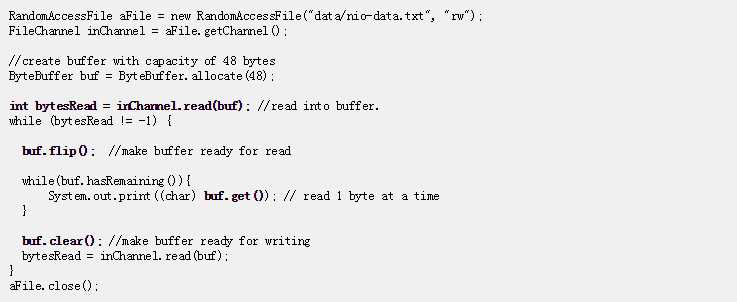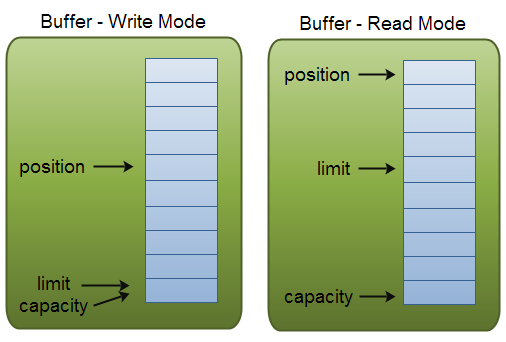Java NIO Buffer
Posted
tags:
篇首语:本文由小常识网(cha138.com)小编为大家整理,主要介绍了Java NIO Buffer相关的知识,希望对你有一定的参考价值。
Java NIO Buffer
Java NIO Buffers are used when interacting with NIO Channels. As you know, data is read from channels into buffers, and written from buffers into channels.
A buffer is essentially a block of memory into which you can write data, which you can then later read again. This memory block is wrapped in a NIO Buffer object, which provides a set of methods that makes it easier to work with the memory block.
Basic Buffer Usage
Using a Buffer to read and write data typically follows this little 4-step process:
- Write data into the Buffer
- Call
buffer.flip() - Read data out of the Buffer
- Call
buffer.clear()orbuffer.compact()
When you write data into a buffer, the buffer keeps track of how much data you have written. Once you need to read the data, you need to switch the buffer from writing mode into reading mode using the flip()method call. In reading mode the buffer lets you read all the data written into the buffer.
Once you have read all the data, you need to clear the buffer, to make it ready for writing again. You can do this in two ways: By calling clear() or by calling compact(). The clear() method clears the whole buffer. The compact() method only clears the data which you have already read. Any unread data is moved to the beginning of the buffer, and data will now be written into the buffer after the unread data.
Here is a simple Buffer usage example, with the write, flip, read and clear operations maked in bold:

Buffer Capacity, Position and Limit
A buffer is essentially a block of memory into which you can write data, which you can then later read again. This memory block is wrapped in a NIO Buffer object, which provides a set of methods that makes it easier to work with the memory block.
A Buffer has three properties you need to be familiar with, in order to understand how a Buffer works. These are:
- capacity
- position
- limit
The meaning of position and limit depends on whether the Buffer is in read or write mode. Capacity always means the same, no matter the buffer mode.
Here is an illustration of capacity, position and limit in write and read modes. The explanation follows in the sections after the illustration.
 |
| Buffer capacity, position and limit in write and read mode. |
Capacity
Being a memory block, a Buffer has a certain fixed size, also called its "capacity". You can only write capacity bytes, longs, chars etc. into the Buffer. Once the Buffer is full, you need to empty it (read the data, or clear it) before you can write more data into it.
Position
When you write data into the Buffer, you do so at a certain position. Initially the position is 0. When a byte, long etc. has been written into the Buffer the position is advanced to point to the next cell in the buffer to insert data into. Position can maximally become capacity - 1.
When you read data from a Buffer you also do so from a given position. When you flip a Buffer from writing mode to reading mode, the position is reset back to 0. As you read data from the Buffer you do so from position, and position is advanced to next position to read.
Limit
In write mode the limit of a Buffer is the limit of how much data you can write into the buffer. In write mode the limit is equal to the capacity of the Buffer.
When flipping the Buffer into read mode, limit means the limit of how much data you can read from the data. Therefore, when flipping a Buffer into read mode, limit is set to write position of the write mode. In other words, you can read as many bytes as were written (limit is set to the number of bytes written, which is marked by position).
Buffer Types
Java NIO comes with the following Buffer types:
- ByteBuffer
- MappedByteBuffer
- CharBuffer
- DoubleBuffer
- FloatBuffer
- IntBuffer
- LongBuffer
- ShortBuffer
As you can see, these Buffer types represent different data types. In other words, they let you work with the bytes in the buffer as char, short, int, long, float or double instead.
The MappedByteBuffer is a bit special, and will be covered in its own text.
Allocating a Buffer
To obtain a Buffer object you must first allocate it. Every Buffer class has an allocate() method that does this. Here is an example showing the allocation of a ByteBuffer, with a capacity of 48 bytes:
ByteBuffer buf = ByteBuffer.allocate(48);
Here is an example allocating a CharBuffer with space for 1024 characters:
CharBuffer buf = CharBuffer.allocate(1024);
Writing Data to a Buffer
You can write data into a Buffer in two ways:
- Write data from a
Channelinto aBuffer - Write data into the
Bufferyourself, via the buffer‘sput()methods.
Here is an example showing how a Channel can write data into a Buffer:
int bytesRead = inChannel.read(buf); //read into buffer.
Here is an example that writes data into a Buffer via the put() method:
buf.put(127);
There are many other versions of the put() method, allowing you to write data into the Buffer in many different ways. For instance, writing at specific positions, or writing an array of bytes into the buffer. See the JavaDoc for the concrete buffer implementation for more details.
flip()
The flip() method switches a Buffer from writing mode to reading mode. Calling flip() sets the position back to 0, and sets the limit to where position just was.
In other words, position now marks the reading position, and limit marks how many bytes, chars etc. were written into the buffer - the limit of how many bytes, chars etc. that can be read.
Reading Data from a Buffer
There are two ways you can read data from a Buffer.
- Read data from the buffer into a channel.
- Read data from the buffer yourself, using one of the get() methods.
Here is an example of how you can read data from a buffer into a channel:
//read from buffer into channel. int bytesWritten = inChannel.write(buf);
Here is an example that reads data from a Buffer using the get() method:
byte aByte = buf.get();
There are many other versions of the get() method, allowing you to read data from the Buffer in many different ways. For instance, reading at specific positions, or reading an array of bytes from the buffer. See the JavaDoc for the concrete buffer implementation for more details.
rewind()
The Buffer.rewind() sets the position back to 0, so you can reread all the data in the buffer. The limit remains untouched, thus still marking how many elements (bytes, chars etc.) that can be read from the Buffer.
clear() and compact()
Once you are done reading data out of the Buffer you have to make the Buffer ready for writing again. You can do so either by calling clear() or by calling compact().
If you call clear() the position is set back to 0 and the limit to capacity. In other words, the Buffer is cleared. The data in the Buffer is not cleared. Only the markers telling where you can write data into the Buffer are.
If there is any unread data in the Buffer when you call clear() that data will be "forgotten", meaning you no longer have any markers telling what data has been read, and what has not been read.
If there is still unread data in the Buffer, and you want to read it later, but you need to do some writing first, call compact() instead of clear().
compact() copies all unread data to the beginning of the Buffer. Then it sets position to right after the last unread element. The limit property is still set to capacity, just like clear() does. Now the Buffer is ready for writing, but you will not overwrite the unread data.
mark() and reset()
You can mark a given position in a Buffer by calling the Buffer.mark() method. You can then later reset the position back to the marked position by calling the Buffer.reset() method. Here is an example:
buffer.mark(); //call buffer.get() a couple of times, e.g. during parsing. buffer.reset(); //set position back to mark.
equals() and compareTo()
It is possible to compare two buffers using equals() and compareTo().
equals()
Two buffers are equal if:
- They are of the same type (byte, char, int etc.)
- They have the same amount of remaining bytes, chars etc. in the buffer.
- All remaining bytes, chars etc. are equal.
As you can see, equals only compares part of the Buffer, not every single element inside it. In fact, it just compares the remaining elements in the Buffer.
compareTo()
The compareTo() method compares the remaining elements (bytes, chars etc.) of the two buffers, for use in e.g. sorting routines. A buffer is considered "smaller" than another buffer if:
- The first element which is equal to the corresponding element in the other buffer, is smaller than that in the other buffer.
- All elements are equal, but the first buffer runs out of elements before the second buffer does (it has fewer elements).
以上是关于Java NIO Buffer的主要内容,如果未能解决你的问题,请参考以下文章